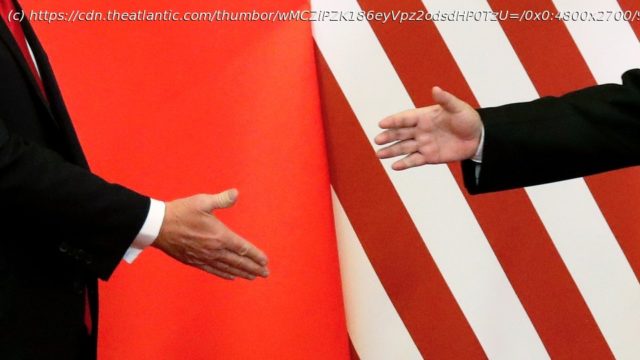A “grand bargain” with Beijing has obvious appeal. The question is what it would cost.
During his term in office, President Donald Trump jettisoned four decades of engagement with Beijing in favor of a more confrontational approach. His policy treated China as a strategic and economic competitor—and it stuck, making China policy one of Trump’s lasting legacies and a rare subject on which Democrats and Republicans now agree.
So it’s striking that this year, campaigning for reelection, Trump appears to be softening his stance. He trots out the old rhetoric—accusing the Chinese of stealing American jobs, taking advantage of the United States, and starting the coronavirus pandemic, which he still calls the “China virus,” for example—but he has also sounded a different note, suggesting that the U.S. needs better relations with Beijing to reduce the threat China poses to international security. Exactly how he intends to achieve this without sacrificing core American interests, he has not made clear.
Trump’s foreign policy tended to be transactional, focused on dealmaking and devoid of guiding strategic principles. During his term, he sought “wins” that allowed him to show off his (supposedly) superior negotiating skill to a domestic audience. With China, that approach led him to focus on a trade war that kept him haggling over tariffs, largely to the exclusion of other important issues. He still brags (and dissembles) about the resulting trade agreement, reached in 2020, describing it as “the best trade deal” ever made, even though Beijing never fulfilled its terms.
Ali Wyne, a senior research and advocacy adviser on U.S.-China relations at International Crisis Group, argues that Trump may have believed that the trade pact was a prelude to a larger, more comprehensive agreement with Beijing that would have settled many contentious matters between the two countries. “Trump still holds out some hope that he might be able to execute some kind of grand bargain,” Wyne told me, “and then claim that ‘look, I was able to achieve a breakthrough in stabilizing the world’s most consequential bilateral relationship that none of my predecessors could.’”
A “grand bargain” with China has obvious appeal. The question is what it would cost. A persistent worry in foreign-policy circles is that Trump will make concessions to Beijing on issues that have been historically crucial to the United States, but about which he personally seems to care little—such as the fate of Taiwan—in exchange for promises on matters he clearly considers more important, such as trade.
Last year, Trump proposed a trade policy that he pledged would “completely eliminate U.S. dependence on China,” which he called “the primary beneficiary of Democrats’ globalist agenda.” During his debate with Vice President Kamala Harris on Tuesday, Trump reiterated his plan to increase tariffs substantially on China, as well as other countries.
Trump has also said that he will restrict Chinese ownership in certain industries in the United States, including medical supplies and natural resources. But whether he would really follow through on this is not obvious.






